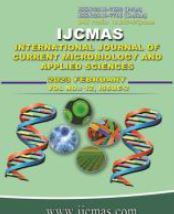


 National Academy of Agricultural Sciences (NAAS)
National Academy of Agricultural Sciences (NAAS)

|
PRINT ISSN : 2319-7692
Online ISSN : 2319-7706 Issues : 12 per year Publisher : Excellent Publishers Email : editorijcmas@gmail.com / submit@ijcmas.com Editor-in-chief: Dr.M.Prakash Index Copernicus ICV 2018: 95.39 NAAS RATING 2020: 5.38 |
Use of broad spectrum antibiotics, immunodeficiencies and advances in medical practice have all contributed to increased fungal infection over the two decades and Candida has emerged as a major cause of human disease, furthermore there is an increase in nonalbicans candida species in many countries. In this study, an attempt was made to speciate, characterize, and determine the antifungal susceptibility pattern of Candida isolated from urinary tract infections (UTIs). The main aim and objectives of this study to isolate and identify Candida from urine samples in a tertiary care hospital; To determine the in vitro efficacy of antifungal agents of Candida species. And to detect susceptibility of Candida species to antifungal drugs isolated from urine samples. Also to determine antifungal sensitivity pattern by disc diffusion method as per CLSI guidelines. This study was conducted in GMKMCH, Salem between July 2022 and November 2022 among patients of age group more than 18 yrs admitted having candiduria. Patient who was on antifungal therapy within past 6 months were not included in the study. Urine samples sent from patients admitted in GMKMCH with candiduria are cultured in SDA. Antifungal susceptibility test performed by disc diffusion method using Muller hinton agar with 2% glucose and 0.005% methylene blue as per CLSI M22 latest guidelines.22 Results interpreted by using standard method as per CLSI M 22 guidelines. Determination of Antifungal sensitivity pattern of Candida species isolated. Out of the 8 C.tropicalis isolates all the 8 were sensitive to Amphotericin B and Voriconazole, 5 were sensitive to Fluconazole and Ketaconazole and 6 were sensitive to Itraconazole. In C.albicans all the 9 were sensitive for Amphotericin B and voriconazole and 6 were sensitive to Fluconazole, Ketaconazole and Itraconazole. 100% of the isolates of C.parapsilosis were sensitive to Amphotericin B and Voriconazole, and 50% of them were sensitive to Fluconazole, Ketaconazole, 75% of them were sensitive to Itraconazole. In C.glabrata species 100% sensitivity for Amphotericin B,Voriconazole and Itraconazole was observed. C.krusei was 100% sensitivity for Amphotericin B and Voriconazole, 66% were sensitive to Fluconazole, 33% of them were sensitive for ketaconazole. C.tropicalis was the most common Non albicans candida isolated. 37% of isolates showed resistance to Fluconazole. Resistance to Fluconazole in clinical isolates of C.tropicalis has increased. According to this study, there was an increase in the incidence and antifungal resistance of Non albicans Candida species, specifically C. krusei, C. glabrata and C. tropicalis. Due to the advent of non-albicans Candida species causing UTIs that are intrinsically resistant to certain antifungal agents like azoles and increasing incidence of antifungal resistance, it is essential to monitor the antifungal susceptibility profile of Candida species causing candiduria.
 |
 |
 |
 |
 |